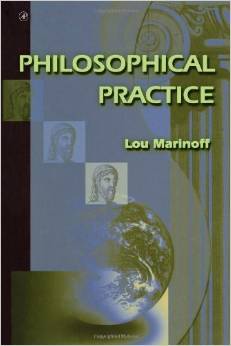
This book provides a look at philosophical practice from the viewpoint of the practitioner or prospective practitioner. It answers the questions: What is philosophical practice? What are its aims and methods? How does philosophical counseling differ from psychological counseling and other forms of psychotherapy. How are philosophical practitioners educated and trained? How do philosophical practitioners relate to other professions? What are the politics of philosophical practice? How does one become a practitioner? What are the prospects for philosophical practice in the USA and elsewhere? This handbook of Philosophical Practice provides an account of philosophy’s current renaissance as a discipline of applied practice while critiquing the historical, social, and cultural forces which have contributed to its earlier descent into obscurity.
Get Philosophical Practice on Amazon
“This is a most welcome addition to the small, but growing, literature on philosophical practice. It is aimed at all those who do, or who would like, to apply philosophy as a disciplined professional activity outside of academe. It provides an excellent account of the development of philosophical practice, where it might go next, how to get there and the problems it is likely to face. Informed, engaged, polemical, amusing, concerned and passionate. Read it. It describes not just the small, but growing, world of philosophical practice, but also the large and fragmented wider client communities, which could so much benefit from a dose of applied philosophy.”
— Alex Howard, author of Philosophy for Counseling and Psychotherapy
“This book is impressive and very well written. It shows a keen mind, an endless energy, a solid understanding of philosophy, and a genuine capacity to know how to use real philosophy to help with life’s issues. There is no question about the excellence and timeliness of this contribution.”
— Peter Koestenbaum, author of Leadership: The Inner Side of Greatness
Philosophical Practice is written with such clarity and vigor that it will appeal not just to philosophers, but to anyone interested in the role of the academy in society. This book is certainly an excellent guide on how to become a philosophical counselor, and many will want to read it for that reason alone. But Marinoff’s trenchant criticisms of the profession of philosophy should spur an important debate to which most academics will want to contribute. The resulting fireworks will fascinate anyone who cares about contemporary intellectual life.”
— Christian Perring, Ph.D., Professor of Philosophy, Dowling College, Editor of Metapsychololgy Online Review
“Dr. Lou Marinoff is a prominent advocate of the idea that philosophers might actually be good for something. As the author of a successful book on philosophical counseling, Plato, Not Prozac!, Marinoff has captured the attention of the press, and has, thereby, done more than any other American philosopher to advance popular discussion of philosophical counseling. His latest book, Philosophical Practice, moves that cause forward. The earlier book was more for possible clientele; this one is more for the would-be practitioner. It will be a useful book for anyone considering starting a practice as a philosophical counselor, providing an admirable survey of the practical obstacles to be considered. It reviews the history, the politics, the pitfalls, told from the point of view of someone often at the center of controversy. Carving out a place for the counseling philosopher is only one facet of bringing philosophy into the applied world, and this book will get those within and outside of academia thinking creatively about how to mine the discipline. Lou Marinoff’s Philosophical Practice is both provocative and constructive.”
— J. Michael Russell, Ph.D., Research Psychoanalyst, Professor Emeritus, Department of Philosophy, Cal State Fullerton



